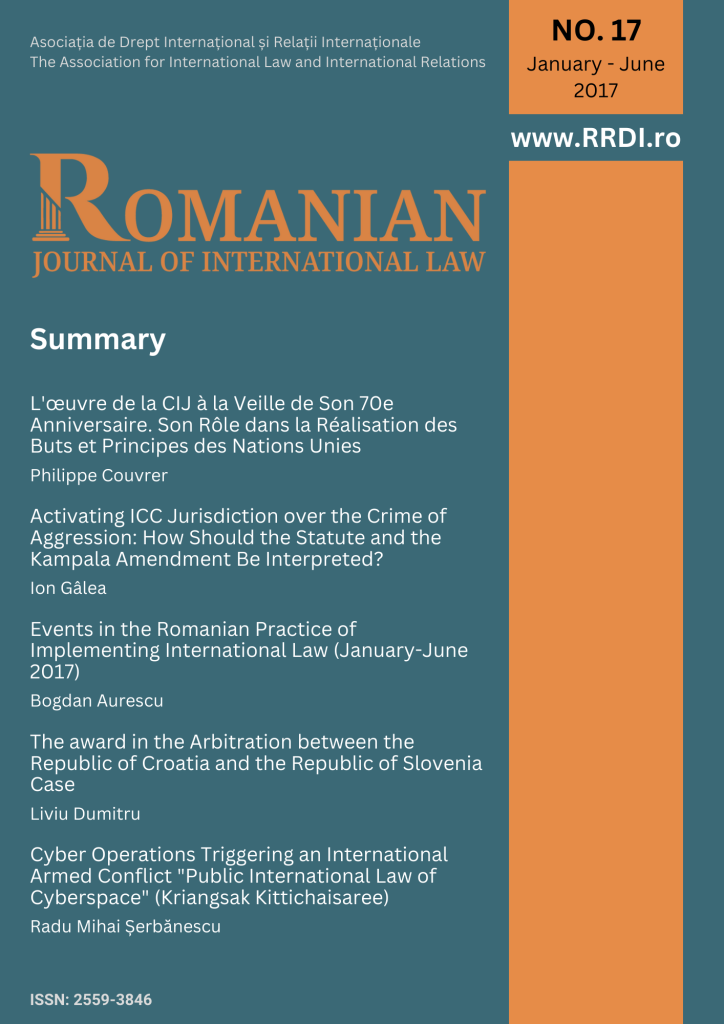L’oeuvre de la CIJ à la Veille de Son 70e Anniversaire. Son Rôle dans la Réalisation des Buts et Principes des Nations Unies
Philippe COUVREUR
Le présent texte fait suite à une intervention de l’auteur lors de la conférence, marquant l’acceptation par la Roumanie de la compétence obligatoire de la Cour internationale de Justice, qui s’est tenue à Bucarest le 29 mai 2015.
Cessation of the International Wrongful Act before the International Court of Justice
Victor STOICA
This article studies the manner in which cessation is interpreted and how it currently applies before the International Court of Justice. The difference between various scholar opinions and the approach that the International Court of Justice has towards this remedy is relevant because coherence and predictability is relevant for both the practitioners and for academics.
Activating ICC Jurisdiction over the Crime of Aggression: How Should the Statute and the Kampala Amendment be Interpreted?
Ion GÂLEA
This study follows up on the most difficult question that remained to be solved after the adoption of the Kampala Amendment, that may lead, if not properly addressed, to shaking consensus for the activation of the jurisdiction of the ICC for the crime of aggression. The interpretation problem concerns the “matrix” of establishing jurisdiction, in the case of an alleged crime of aggression related to an act of aggression committed by a State Party to the Rome Statute which has not ratified or accepted the Kampala Amendment, on the territory of a State Party which has ratified or accepted the Kampala Amendment. The study attempts to argue that the problem is linked to the interpretation of the Rome Statute itself and tries to apply the rules of interpretation of the Vienna Convention on the Law of Treaties to the question.
Events in the Romanian Practice of Implementing International Law (January-June 2017)
Bogdan AURESCU
This brief presentation of the Romanian practice during the first semester of 20172 in implementing international law tries to give an overview of what can be termed as a very rich activity of the Romanian authorities in this field. The paper describes the legal positions expressed on various occasions regarding events with relevance to international law, legal procedures regarding important agreements signed by Romania, Romania’s participation to the most important international organizations etc.
The Award in the Arbitration between the Republic of Croatia and the Republic of Slovenia Case
Liviu DUMITRU
The Award in the Arbitration between the Republic of Croatia and the Republic of Slovenia case has been delivered after procedural complications caused by the revelation of improper communications between the Slovenian Arbitrator and the Slovenian Agent in the case. The Award dealt with both the land and the maritime parts of the border. The land border was decided on the basis of the uti possidetis principle, and by reference to the cadastral limits between the former Yugoslav republics, or, when they were not aligned, on the basis of effectivités. In the Bay of Piran, the Tribunal determined the boundary on the basis of the same principles as in the case of the land border, allocating most of the area of the Bay to Slovenia, due to stronger effectivités. The maritime boundary between the territorial seas was based upon the equidistant line, adjusted to take into account the costal configuration, (which made the equidistance line to produce a cut-off effect for Slovenia). In the most innovative part of the Award, the Tribunal established a ”junction area” linking the Slovenian maritime spaces with the areas beyond the Croatian territorial sea, and spelled out a specific legal regime of this area.
Advantages and Disadvantages of Transparency and Public Participation in Investment Arbitration
Bogdan Ovidiu BIRIȘ
Transparency and public participation in international arbitration proceedings is a relevant issue that has become the subject of many disputes over the last years. Given that international investment arbitration is both public and private in nature, there is a legitimate interest from the public to have increased access, and screening of, previously secretive proceedings. After all, damages awarded to investors by arbitral tribunals are paid almost exclusively from the public purse. Therefore, this paper makes the case for more transparency and access to arbitral proceedings when public interest and welfare are at stake. It analyzes the advantages and disadvantages of more open proceedings from the point of view of the investor, State authorities and the civil society, and takes into account the possible effects this might have on a number of issues such as: duration of proceedings, public interests or sensitive business information. It concludes that although transparency and public participation may, in some cases, hinder the arbitral process, it represents a small price to pay for alleviating public concerns about the ability of international corporations to influence public policies by threatening state authorities with international arbitration.

